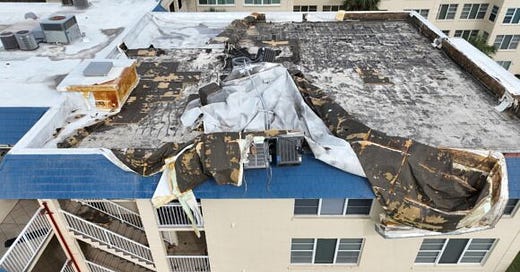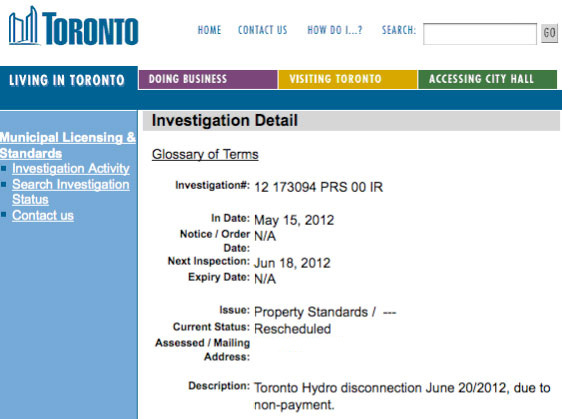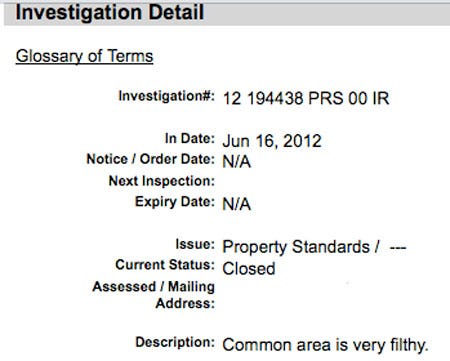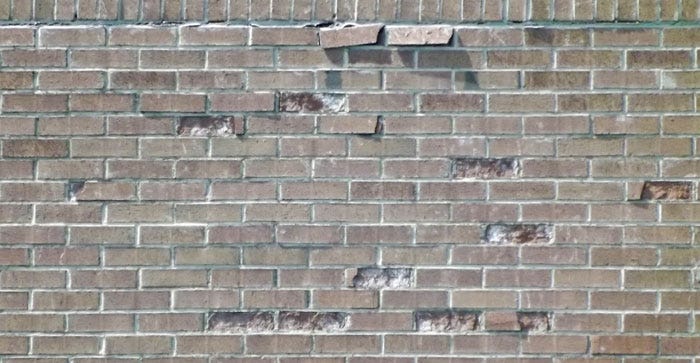Condo updates—March 2025
A Florida condo building after a 2024 hurricane. (Matt Mercier)
Florida Bill Barring Citizens Coverage for Noncompliant Condos Passes Committee
Insurance Journal
By William Rabb March 13, 2025
A Florida House bill that would bar Citizens Property Insurance Corp. from writing condominium properties that haven’t complied with inspection deadlines passed its first hurdle this week. But the measure has been questioned by some as unnecessary and potentially detrimental to struggling condo associations.
House Bill 913, introduced by state Rep. Vicki Lopez, R-Miami, was quickly approved by the House Agriculture, Housing and Tourism Subcommittee earlier this week. It would prohibit Citizens, the state-backed property insurer, from issuing or renewing a policy for a unit owner or a condo association unless the association has completed a milestone inspection and a structural integrity reserve study.
After the Surfside condominium collapse in 2021, which killed 98 people, Florida lawmakers in 2022 required condo buildings of more than three stories tall to complete structural integrity inspections and reserve studies by Dec. 31, 2024. Only about a third of the eligible structures in the state have complied, according to state agency and news reports.
Lopez said after the committee meeting that a “stick” is now required to bring condos in line and ensure safety, and that stick is blocking Citizens’ coverage. The insurer is attractive because other carriers have limited some condo coverage and Citizens is statutorily limited on rate increases and often writes at lower premiums than primary market carriers in Florida.
As of 2024, Citizens held more than 100,411 policies in force for condominiums, including owners and associations, multi-peril, wind-only and dwelling fire policies, according to data from the Florida Office of Insurance Regulation.
A similar Senate bill, SB 1742, does not include the Citizens prohibition. The bill’s sponsor, state Sen. Jennifer Bradley, said that adding that restriction would make things even harder for condominium associations and owners that have faced soaring repair costs and few insurance options, according to the Florida Phoenix news site.
Others, including a condo insurance broker, agreed that the clause is unnecessary.
“Citizens already has strict underwriting guidelines,” requiring much of the same information that HB 913 targets, said Matt Mercier, national director of community associations for CBIZ, an insurance broker and advisory firm.
Florida law and regulations currently allow Citizens, the state’s largest property insurer, to decline to write condo properties that have not shown progress on maintenance, repairs and more. And the corporation is unlikely to bend its rules, anyway, despite some condo owners’ pleas, he noted.
“The state of Florida shouldn’t have to back up community associations unless they have a legit, darn good reason why,” Mercier said.
Lopez’ bill would both provide other relief mechanisms for condos trying to meet inspection and repair deadlines. The measure would, if signed into law, allow association boards to obtain loans and assess new fees for needed maintenance – without the prior approval of the association’s membership.
Both Lopez’ and Bradley’s bills also would let members vote to obtain lines of credit – in lieu of reserves – to meet funding requirements for maintenance and repairs. Bradley’s bill would authorize the condo board to invest their reserve funds.
Lopez’ bill also would impact insurance carriers directly. The measure would allow insurance coverage for condominiums to be based on the replacement value of the property, updated regularly.
“The amount of adequate insurance coverage for full insurable value, replacement cost, or similar coverage may be based on the replacement cost of the property to be insured as determined by an independent insurance appraisal or update of a previous appraisal,” HB 913 reads. “The replacement cost of property covered must be determined every 3 years, at a minimum.”
That could raise the cost of insurance coverage, in some cases. But Mercier said that condo claims payments already end up covering much of the full replacement costs, in many cases. Carriers’ initial payouts may cover actual cash value, but once repairs are completed, condos can claim additional expenses, he noted.
Bradley’s bill has been assigned to committees, but hearings have not been set. The legislative session began March 4 and runs until May 2.
A bad news Status Certificate
A friend bought an investment unit in an older run-down condo corporation in Scarborough. He asked me to take a look at a new Status Certificate. This is the report that I sent him.
After he renovated the unit, and gave all the rooms a fresh coat of paint, Gordon sold his investment unit. He made money so it worked out for him.
That corporation elected a new board and hired a competent management company that is getting the most critical repairs done. What can be put off is getting kicked down the road.
Property values have gone up since that Status Certificate was issued but that is not saying much as, until a year ago, property values have gone up for all condos in the Toronto area.
Emergency exits
This is a parking garage emergency exit at an older residental condo in North York. Does this exit meet the fire code and building standards? Of course not.
I have seen a few condos that have fire escape staircases that look almost as bad as this one.
To be informed, read CondoMadness.
Snow covered stairs
During the winter, snow is often left to pile up in the parking garage emergency staircases. Sometimes the snow blocks the doors so people are not able to leave the garage. In all cases, the stairs are so full of snow, people would not be able to climb to safety.
This fire code violation occurs every winter in many most condos and rental highrise buildings. The building superintendents don’t know that shovelling out these staircases is required and the managers do not check them.
Building standards—Toronto
Oh dear, this condo corporation wasn’t paying their hydro bill and Toronto Hydro was going to disconnect. This notice on 15 May 2012, woke up the Board and they scraped up the money and paid their bill pronto.
One of thr residents was monitoring the building on the Municipal Licensing & Standards website. (Every building in the city has its status posted on the Internet.)
The inspector showed up on 16 June 2012 when he issued another work order.
Municipal Licensing & Standards inspections are complaint driven. The source of all complaints are kept confidential.
Crumbling bricks
Never let brick walls get this bad. This is a water leak problem that will just get worse. There is no cheap fix. If you see a building that is wrapped in steel cladding, it probably hiding bricks that look this bad.



















